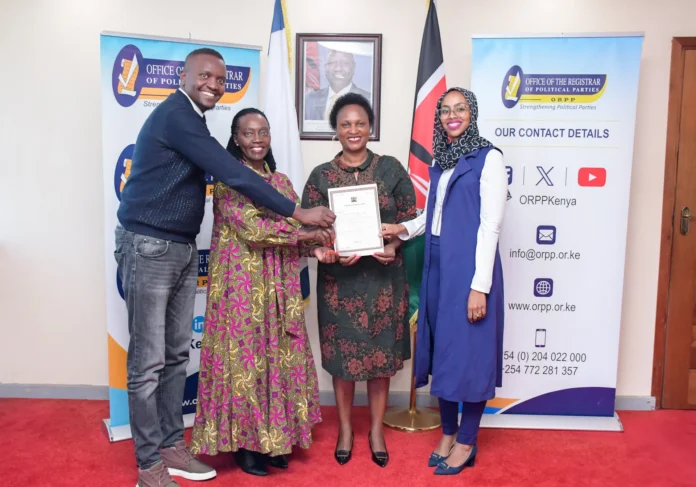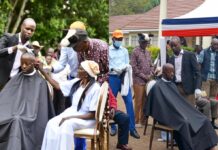Martha Karua’s Narc Kenya party has officially rebranded as the People’s Liberation Party (PLP), in a strategic move aimed at appealing to Kenya’s younger generation, particularly the influential Generation Z. This name change, which was finalized on January 25, 2025, is part of the party’s larger efforts to improve its public appeal ahead of the highly anticipated 2027 general election, in which the youth vote is expected to play a critical role in shaping the outcome.
Anne Nderitu, the Registrar of Political Parties, granted legal approval for the rebranding and presented the formal document to Karua at the ORPP’s office in Lion Place. During the ceremony, Nderitu praised Narc Kenya for following the required legal procedures under the Political Parties Act of 2011. She also urged the party to continue promoting nationalism and ensuring political rights for all Kenyans.
Anne Nderitu, the Registrar of Political Parties, granted legal approval for the rebranding and presented the formal document to Karua at the ORPP’s office in Lion Place. During the ceremony, Nderitu praised Narc Kenya for following the required legal procedures under the Political Parties Act of 2011. She also urged the party to continue promoting nationalism and ensuring political rights for all Kenyans.
“I urge the party to promote nationalism and uphold the realization of political rights,” Nderitu said.
Along with the name change, the party has unveiled a new visual identity. Narc Kenya’s traditional red and white colours have been replaced with a new colour scheme of lilac, white, and purple, and the party’s logo has changed from the iconic rose to a purple rose. This new design reflects the party’s desire to modernise its image and better connect with young voters, who are expected to dominate the 2027 election.
Karua, who has led Narc Kenya for several years, framed the rebranding as part of a broader generational shift in the country’s political leadership. In a statement, she noted that the name change was not a sudden decision but a process that had been in the works since May of the previous year.
Karua, a long-standing figure in Kenyan politics, also stated that the party’s internal governance structure will be altered further. One of the most notable reforms is the implementation of term limits for top party leaders, which Karua hopes will set a precedent for other political parties in the country.
The decision to impose term limits is viewed as a bold and progressive step in an era when many Kenyan political parties are frequently condemned for their established leadership. Karua’s commitment to this reform is consistent with her larger agenda of promoting greater political accountability and inclusivity within the country’s political systems.
In addition to the rebranding, Karua’s efforts are part of a larger political landscape in which established and emerging leaders compete for the support of a younger, more politically active generation. In recent years, the youth have become more vocal, particularly in their opposition to Kenya’s current Kwanza administration. Many young Kenyans have advocated for more economic opportunities, political reforms, and increased representation, making them an important voting bloc in the 2027 elections. According to the Kenya National Council for Population and Development, the 2019 census revealed that more than 75% of Kenya’s population is under the age of 35, totalling approximately 35.7 million individuals.
The 2027 general election is shaping up to be a highly competitive race for the youth vote, with presidential candidates and political parties tailoring their strategies to capture this demographic’s attention and support. In this context, Karua’s rebranding and emphasis on youth-oriented policies may help her and her party build a stronger bond with young voters, who are increasingly seeking political and economic freedom.
Karua’s announcement about the party’s rebranding comes shortly after she and Deputy President Rigathi Gachagua hinted at a potential political alliance. The two leaders have expressed a desire to collaborate and work together to support the youth vote. Both have urged young people to register to vote, emphasising the importance of their involvement in the democratic process. The political collaboration between Karua and Gachagua adds an interesting dimension to the changing political landscape, as the two leaders, who were previously seen as political rivals, have expressed a shared interest in appealing to the youth demographic.
Narc Kenya’s rebranding as the People’s Liberation Party is more than just a name change or symbol; it is a bold statement of intent, ushering in a new era in Kenya’s political landscape that aims to empower the next generation of leaders and voters. As political parties compete for positions ahead of the 2027 elections, one of the most defining aspects of the campaign season will be the race to win over Gen Z voters.



















